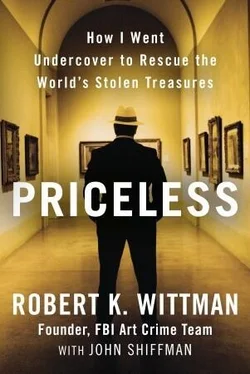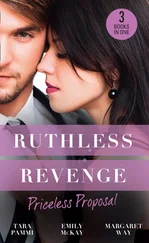“… And so, in just a few months, if you became a special agent, you could find yourself driving a high-powered car with a shotgun on the side of a mountain or on an Indian reservation, and you might be the only law around for thirty miles…”
That sounded pretty cool. Working alone, supervising no one. Carrying a shotgun. Representing the U.S. government. Protecting the innocent, prosecuting evil. The only law around for miles.
The agent looked me over once more. “Let me ask you something.” He pointed through the door to my newspaper employees scurrying to put out the next edition. “Why do you want to leave all this? You make $65,000 and you’re the boss, the owner. In the FBI, you’ll start at $25,000 and be told what to do, where to live.”
I didn’t hesitate. “Easy choice. I’ve always wanted to be an FBI agent.”
We shook hands.
There was one more test—the FBI’s physical training test, a complexly scored series of exercises—running, pull-ups, push-ups, sit-ups. I was thirty-two years old, and had to train to pass. That summer, every evening after work, I hit the local track. The whole family joined me, Donna pushing baby Jeffrey in an umbrella stroller as toddler Kevin ran behind her. I passed and won entrance to the FBI Academy. On the Sunday of Labor Day weekend 1988, we drove to Donna’s parents’ home on the Chesapeake Bay to celebrate Kevin’s fourth birthday and my entrance into the FBI. We lined six picnic tables side by side—sixty friends, neighbors, and family members munching burgers and hot dogs, cracking large steamed crabs, sipping chilled Budweiser by the bay. There were toasts, hugs, and family photos. It was bittersweet. The next day, I piled into Donna’s aging Malibu, left my family, and headed to Quantico, Virginia, to report for the fourteen-week FBI Academy.
From the first day, I was struck by how much each of my fifty classmates had in common. We were mostly conservative, roughly thirty years old, patriotic, clean-cut. I was also struck by the fact that unlike me, most recruits came to the Academy with a law-enforcement background. They were ex-soldiers and former policemen, people who embraced military bearing and physical contact. They enjoyed boxing, wrestling, kicking, handcuffing and firing weapons, taking pepper spray in the face as part of a manly rite of passage. I didn’t share their macho creed. While I understood that my job might be dangerous, and I stood willing to sacrifice myself to save a civilian or a fellow agent, that didn’t mean I would do something stupid. I always scored well on FBI written tests because I knew the correct answer in most scenarios was to call for backup, not to play hero. Question: Two armed men rob a bank, fire at a police officer, and duck into a home. What do you do? Answer: Call for backup and the SWAT team . The military might be willing to accept some losses, but in law enforcement there is no such thing as an acceptable loss. The physical training at the academy was necessary, but I found it something to endure, not embrace. Thankfully, my dorm roommate, Larry Wenko, shared my view. Larry came up with a mantra that helped us get through the hellish fourteen weeks: Here to Leave .
In our final weeks at the academy, we received our postings. Donna and I had hoped for Honolulu. We got Philly.
It was not a choice assignment. In 1988, Philadelphia was grimy, expensive, and a decade away from making its great comeback. I tried to make the best of it, lamely reminding Donna that Philadelphia was only ninety minutes from our relatives in Baltimore. She laughed and bit her tongue. We both knew we weren’t moving to Philadelphia for its location or quality of life. We moved to Philadelphia so I could pursue my dream.
We didn’t realize how fortuitous the FBI’s choice would be. Philadelphia is home to two of the nation’s best art museums and one of the country’s largest archaeology collections.
The month I reported for duty, two of them were robbed.
Chapter 4
MASK OF THE MAN WITH THE BROKEN NOSE
Philadelphia, 1988 .
THE FIRST THIEF HIT THE RODIN MUSEUM, AN ELEGANT building dedicated to the French artist who sparked the Impressionist movement in sculpture.
The museum holds the largest collection of Rodin’s work outside of Paris and sits prominently on the northwestern edge of Philadelphia’s grand boulevard, the Benjamin Franklin Parkway. The Rodin is managed by its sprawling neighbor, the Philadelphia Museum of Art, which boasts paintings by Dalí, Monet, van Gogh, Rubens, Eakins, and Cézanne. In pop culture, the Philadelphia Museum of Art is better known as the spot where Sylvester Stallone jogged up seventy-two steps in the movie Rocky . It’s an exhausting climb. The flat terrain in front of the Rodin Museum, on the other hand, is far more hospitable. The only barrier between the museum and the parkway is a lovely courtyard anchored by a six-and-a-half-foot-tall cast of the artist’s most famous work, The Thinker .
On November 23, 1988, a troubled young man entered the Rodin Museum at 4:55 p.m., five minutes before closing time. The winter sun had already set, and the museum was nearly empty. The man wore blue jeans, white sneakers, a dark T-shirt, and a long gray tweed overcoat. His dirty blond hair fell below his shoulders, and the guards at the door figured he was an art student. The lone cashier at the tiny gift shop did not notice the man until he spoke.
“This is business!” the bandit announced as he drew a .25-caliber Raven pistol, a Saturday night special with a worn wooden grip. “On the floor, I say!” He pointed the shiny silver barrel at the guards, but the weapon was so small and the man spoke so theatrically that the guards hesitated. Was this an act? A prank? Was this guy unhinged? He spoke with the lilt of a British accent, but was clearly American. With his hair slicked back and his high cheekbones, he looked a little like James Dean. When no one moved, the man fired a shot into the wall.
The guards dropped to the floor.
The thief kneeled down, the weapon trembling in his left hand, and handcuffed each guard. He moved to the Rodin sculpture closest to the front door, Mask of the Man with the Broken Nose , a ten-inch-high bronze of a bearded middle-aged man with a weathered face, and snapped it from its marble podium. He turned and dashed out the front door, cradling the sculpture like a football, through the museum courtyard and past The Thinker . When the thief reached the edge of the museum grounds at the Ben Franklin Parkway, he turned west toward the art museum, disappearing into the maze of rush-hour traffic.
It was my first month as an FBI agent.
On its face the heist seemed like a simple, stupid, uncivil act. How ironic that my work on the investigation would open worlds I had never considered—the struggles of one of Impressionism’s most significant artists, the dream of a Roaring Twenties tycoon who sought to share an artist’s extraordinary beauty with his fellow Philadelphians, and the hopeful, often hapless mind of the art thief. Looking back, I see now that it sparked an interest I would turn into a career. But during my first month on the job, I was focused on more basic tasks, like remembering to take my radio with me on stakeouts.
Back then, the FBI didn’t have full-time art crime investigators. In fact, the theft of art and antiquities from museums wouldn’t become a federal crime until 1995. The theft of an object of art or cultural significance was treated like the theft of any valuable piece of property. The property-theft squad handled it. Usually, the FBI didn’t become involved in art crime cases unless there was evidence that a stolen piece was carried across a state line, a federal crime. But in Philadelphia, there was one guy, a respected agent named Bob Bazin, who liked to work museum cases. He worked closely with the Philadelphia police, and they often consulted with him on thefts. I got lucky. When I graduated from the Academy and reported for duty, I was assigned to partner with Bazin.
Читать дальше












